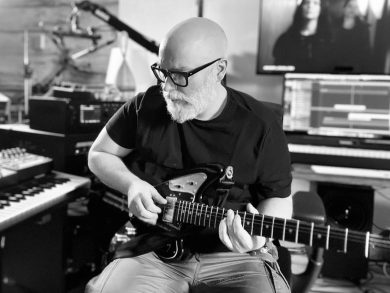Initially trained as a guitarist, Kim Gaboury first made a name for himself with Akido, an electronic music project, before switching almost exclusively to composing for TV and film. After being nominated three times in the upcoming Gala des Gémeaux, the happily busy music creator generously took time away from his studio, where he works on several projects simultaneously, to answer our questions.
Kim Gaboury loves deadlines. Creating under pressure, to deliver an incredible amount of music in very little time, and having to deal with the sometimes insane requirements of the TV and film production universe, have been part and parcel of his daily life for years. And despite the fact that he’s exhausted most of the time, he wouldn’t change anything.
“Composing is organizing sounds in space and time, but when you’re a screen composer, you need another level of time management,” he explains. “We exist at the end of the chain, so we suffer for any production delay. But at the same time, there’s something stimulating in knowing that our music can change the tone of a scene. Besides, stress isn’t always negative, it can also be stimulating. As my friend Michel Cusson always says, no deadline, no music!”
Gaboury doesn’t drop the UZEB guitarist’s name just to brag. Before becoming a friend and collaborator, Michel Cusson was Gaboury’s mentor, the person who literally taught him the rudiments of screen composing. “My Akido project already existed, but I wanted to earn a living from making music,” he remembers. “I enrolled at Musitechnic, but I’d been playing music since the age of 11, and I also had a solid knowledge of studio techniques. I quickly realized that wouldn’t teach me much and just quit a week later.”

Photo by Kim Gaboury
That was back in 2004. Determined to acquire practical knowledge, Kim sought out real professionals who could help put his career on the right path, and Cusson’s name was at the top of his wish list. “I’m not the type to insist when I’m told no, but I had to ask three times before he said yes!” says Gaboury. “It became clear very quickly that I wouldn’t just be his assistant, but a collaborator.”
Almost a decade later, Gaboury and Cusson founded the Melodika collective, and surrounded themselves with other composers in order to meet the increasing demand of the film and TV world. Their relationship deepened as time went on, and the best example of that is their collaboration on major TV projects like Unité 9, À coeur battant and District 31. “It took me years to master this form of composition,” says Gaboury. “Now, it’s become a playground where I have fun. Despite the obvious constraints, there’s a huge amount of freedom when you’re working with images: I can allow myself to do really weird stuff, like using noise, or experimental music, even in a mainstream series.”
Despite the fact that he’s being pestered by some of his following who’d like to hear more Akido productions, it seems that the project will lie fallow until further notice. The fact is, Gaboury is increasingly enjoying working on projects like Classé Secret, a police drama by Stéphan Beaudoin, featuring Mélissa Désormeaux-Poulin.
Gaboury’s three nominations at this year’s Gala des Gémeaux are in the Best Original Music and Best Original Theme Song categories for Classé Secret, and Best Theme Song for Les histoires bizarres du professeur Zarbi, by the creators of Têtes à Claques.
“I’m always surprised and touched that people in the industry think of me, but I also try not to give too much value to awards. Mind you, maybe that’s just because I haven’t won a Gémeaux yet!” he says with a giggle. “But this year is very different, because I’m competing against Hans Zimmer [nominated for his score to Xavier Dolan’s La nuit où Laurier Gaudreault s’est réveillé (The Night Logan Woke Up)], which is absolutely surreal!”
Aside from winning a Gémeaux Award over the celebrated German-American film composer, does Gaboury still have any professional dreams left to fulfil? “A major TV series like Ozark or Breaking Bad, that develops over several seasons, would truly be a gift,” he says. “Otherwise, I hope to keep working with the director Stéphan Beaudoin, because if there’s anyone in Québec who can create a great series that will sell internationally, it’s him.”